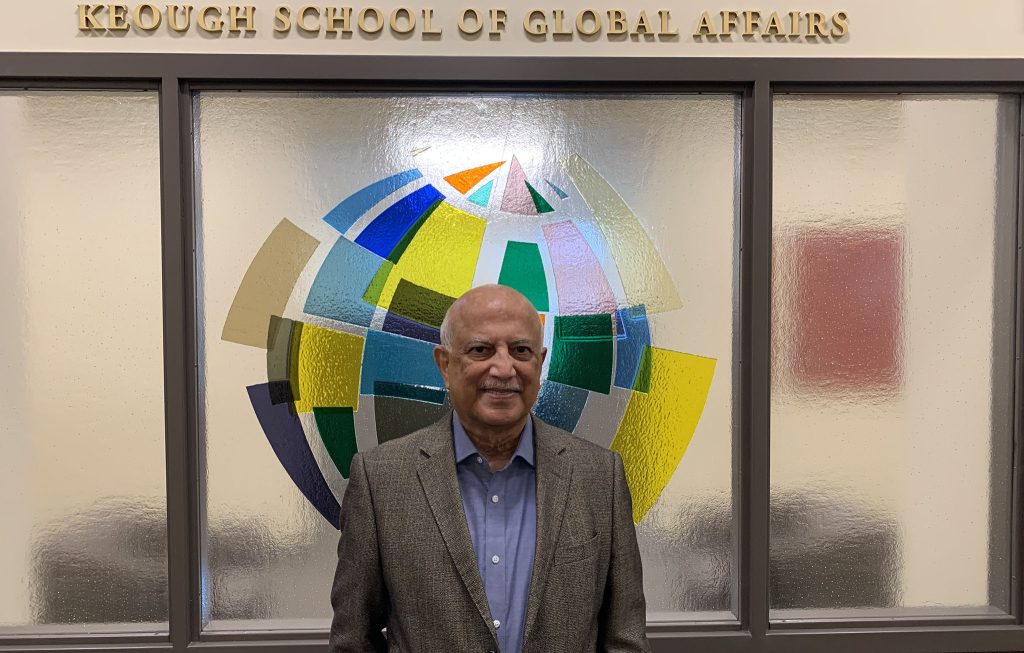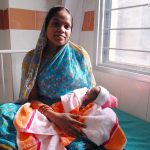Bangladesh survived genocide, mass rape, and a bloody war to win its independence from Pakistan in 1971. But when the fledgling country emerged from the horrific conflict, it immediately faced a fresh life-or-death struggle as it sought to address multiple public health crises.
The situation was grim, recalled Mushtaque Chowdhury, a visiting scholar at the Keough School’s Pulte Institute for Global Development and the University of Notre Dame’s Eck Institute for Global Health.
Bangladeshis navigated a range of deadly challenges in everyday life, including malnutrition and communicable diseases. Life expectancy at birth was only 45 years—and that low average obscured gender inequalities. Child marriage remained commonplace, and a significant number of women and girls died giving birth.
At the time, US Secretary of State Henry Kissinger reportedly dismissed the world’s second-poorest country as an “international basket case,” reflecting a cynical global consensus.
“But over the last 50 years, we have proven that wrong,” Chowdhury said. Indeed, he noted, policy interventions in a wide range of areas—from maternal mortality to nutrition and safe drinking water, from information campaigns to innovative home treatments—have saved lives and significantly improved quality of life across the country.
Now, as a visiting scholar at Notre Dame, Chowdhury is sharing takeaways from his work in Bangladesh to help colleagues at the University and beyond address global health and poverty issues. On October 18, in conjunction with World Food Day, he will participate in a Keough School policy conversation on global health and nutrition lessons from Bangladesh—one of many opportunities he’s taking to make a broader impact.
“I’m grateful for the opportunity to participate in policy-relevant discussions like this one,” Chowdhury said, “and, more broadly, to work with scholars and researchers at the Pulte Institute, the Keough School, and the University of Notre Dame to provide solutions to pressing global issues.”
A global development case study
During his time at Notre Dame, Chowdhury will draw on lessons from the turnaround in Bangladesh. Today, he said, the country’s public health prognosis is stronger than it was five decades ago. Cholera and diarrhea are no longer death sentences. Life expectancy has soared.
What can global development policymakers and practitioners learn from Bangladesh?
The country’s persistent development and public health gains amid challenges have attracted widespread news coverage and impressed policymakers worldwide. And its success raises important questions: How did Bangladesh make progress? And what can global development policymakers and practitioners learn from its experience?
These are among the questions Chowdhury considered in a recent volume he co-edited, 50 Years of Bangladesh: Advances in Health. The work features insights from more than 100 contributors, chronicling how the country empowered nongovernmental organizations to experiment in finding evidence-based solutions that could be widely implemented.
Chowdhury is working to share further insights as a visiting scholar on campus. At the Keough School’s Pulte Institute, he collaborates with researchers to tackle a range of development challenges, including expanding access to healthcare, addressing public health risks, and preventing people from falling into poverty because of illness or environmental factors.
Upcoming publications co-authored with school and institute faculty will focus the role of evidence in development, and on the challenges faced by NGOs in the Global South (securing funding in a competitive global landscape that has been stressed by Brexit, the Ukraine war, and the COVID-19 pandemic) and in the Global North (where there is a growing need to shift from providing services to advocacy). Chowdhury is also connecting with colleagues across campus to combat extreme poverty in low- and middle-income countries, where most of the world’s poor live.
Experimenting and exporting policy solutions
For Chowdhury, tackling big challenges and sharing insights with others has been a natural progression. He grew up in a family of civil servants in Bangladesh and considered becoming one himself. When Bangladesh won its freedom, he started thinking more about the new country and the many problems it faced and decided to focus on public health, development, and empowering women and the poor.
Working on these issues led him to join BRAC, a nongovernmental organization founded by Sir Fazle Hasan Abed. The organization, shaped by Abed’s focus on human dignity and realizing the potential of all people, has played a central role in Bangladesh’s turnaround.
At BRAC, Chowdhury witnessed how some of the country’s weaknesses—in this case a lack of funding and government capacity—could be leveraged into strengths. The central government realized that it couldn’t take on public health challenges by itself, so it made space for nongovernmental organizations like BRAC to grow and flourish.
“Today, there are thousands of NGOs in Bangladesh,” Chowdhury said, “And so, one of the lessons from Bangladesh, I think, is the importance of a vibrant space for civil society actors to respond to challenges in communities. That will unleash the power and creativity of people to improve their own conditions. This can be applied in other countries and contexts.”
Another lesson Chowdhury has taken from his work is the importance of experimenting and scaling up what works. Not long after Bangladesh gained independence, BRAC confronted a challenge in treating epidemics like cholera and diarrhea.
Research had determined that oral rehydration therapy, delivered in a simple saline solution, would provide life-saving electrolytes. But the government couldn’t afford to buy enough doses and distribute it to hospitals and clinics. In the 1970s, BRAC devised a workaround. After experimenting and considering what most households had handy, it found that adding a pinch of salt and a fistful of molasses or sugar to a half-liter of water worked just as well.
Importantly, the organization also realized that if no one heard about a potential health intervention, it would never materialize. Starting around 1980, BRAC sent workers across the country to spread the word.
“We decided that we should let people know about it, and BRAC trained thousands of health workers, who went from house to house and taught more than twelve million mothers how to prepare effective solutions,” Chowdhury recalled. “Now, because of this approach, Bangladesh has the world’s highest rate of oral rehydration therapy to treat diarrheal illnesses.”
BRAC, a Bangladeshi NGO, has exported poverty-addressing policy interventions to more than 10 countries.
As BRAC grew and Chowdhury met health and development experts in his travels and professional posts, he quickly realized the power of documentation and communication. Both were needed to ensure the work done by BRAC and other nongovernmental organizations made it beyond the small villages where they began. Over time, BRAC has exported a range of poverty-addressing policy interventions to more than 10 countries.
Now, as Chowdhury focuses on making the most of his time at Notre Dame, he relishes the opportunity to share lessons and insights from a decades-long career—and, as always, to learn from others.
“The Keough School’s focus on both promoting human flourishing and influencing global policy and practice will continue to make a difference to the world’s most vulnerable and marginalized communities,” Chowdhury said, “and I am honored to be a part of this important work.”



